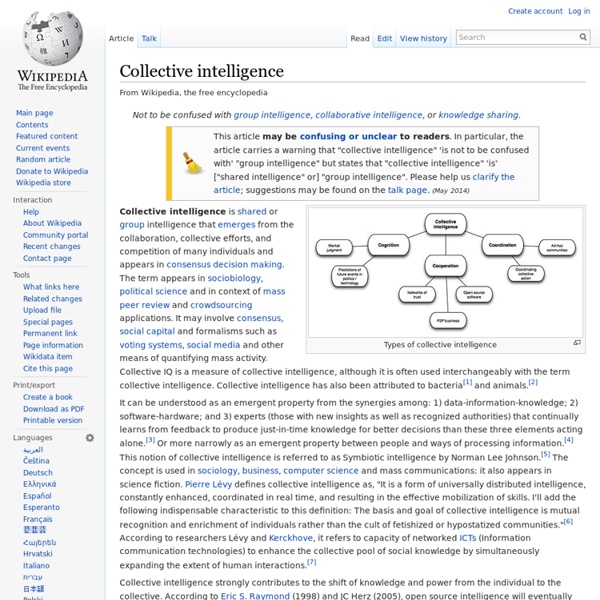Collective intelligence

http://en.wikipedia.org/wiki/Collective_intelligence
Related: Psychology
• Intelligences Ensemble
Le changement de culture d’une Organisation est une opération complexe, multiforme qui nécessite pas mal d’énergie : en cela le terme de Transformation me va mieux et sonne plus juste. Cette transformation peut évidemment s’approcher sous différents angles… le hacking est l’un d’entre eux, une forme différente, détournée voire même virale, ultra pertinente quand il s’agit de changer, d’améliorer, ces éléments culturels du quotidien. Le syndrôme de la réunionite !
About FHI - Future of Humanity Institute
FHI is a multidisciplinary research institute at the University of Oxford. Academics at FHI bring the tools of mathematics, philosophy, social sciences, and science to bear on big-picture questions about humanity and its prospects. The Institute is led by founding Director Professor Nick Bostrom. Humanity has the potential for a long and flourishing future. Our mission is to shed light on crucial considerations that might shape our future.
Sudbury Valley School and Unschoolers: We Are Closer Than You Think — John Holt GWS
The divisive nature of our culture and politics has made everything hard to discuss without falling into absolutist positions, but I was particularly disappointed when I read Dan Greenberg’s essay “Let’s Be Clear: Sudbury Valley Schools and Unschooling Have NOTHING in Common.” Greenberg writes: This essay has been prompted by a feeling of frustration that has finally led me to sit down and face an unpleasant reality: too many people think we are basically an ‘un-schooling’ institution with some sort of added twist. Greenberg’s frustration being associated with unschooling is hard for me to understand because, though unschooling is not a school and Sudbury Valley is a school, there are many common denominators in our motives and goals.
Unlocking the Science of How Kids Think: A new proposal for reforming teacher education
In 2002 I was invited to give a talk to 500 school teachers. The invitation puzzled me, as my research at the time had nothing to do with education; I was a psychologist studying how different parts of the brain support different types of human learning. I mentioned this to the person who invited me, and she said, “We know. We want you to tell us about cognitive psychology. We think our teachers would be interested.” I shrugged, accepted the invitation, and forgot about it.
Theories about groups
Explanations > Theories > Theories about groups Here are academic theories about how groups behave. The pressure to conform Epistemological Weighting Hypothesis: conformance depends on how closely our norms match group norms. Conversion Theory: Minorities can convert majority people.
Related:



